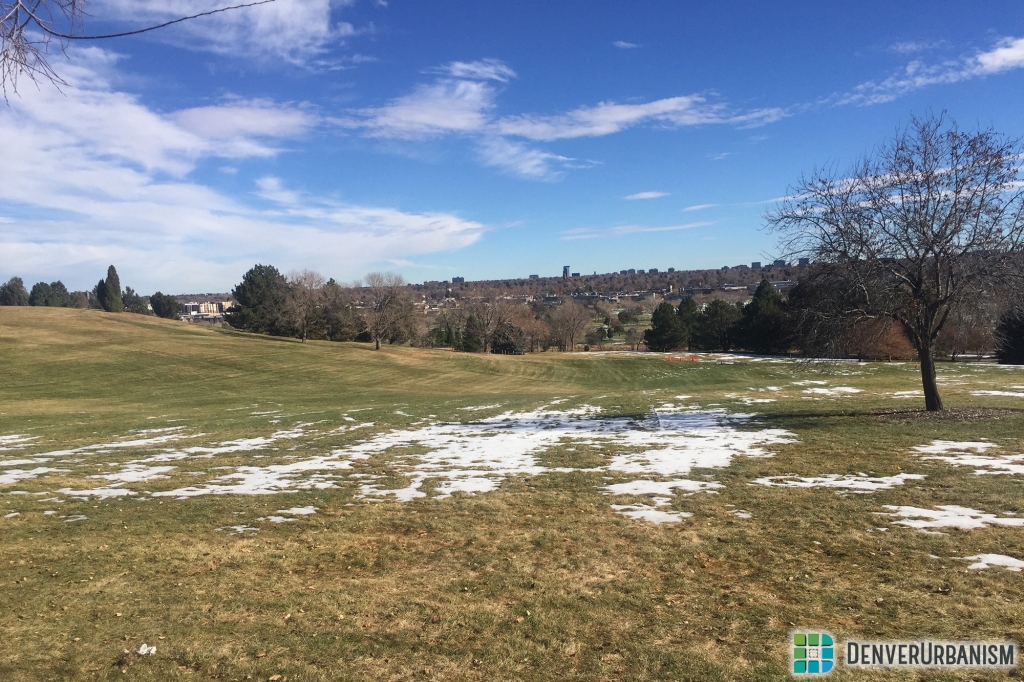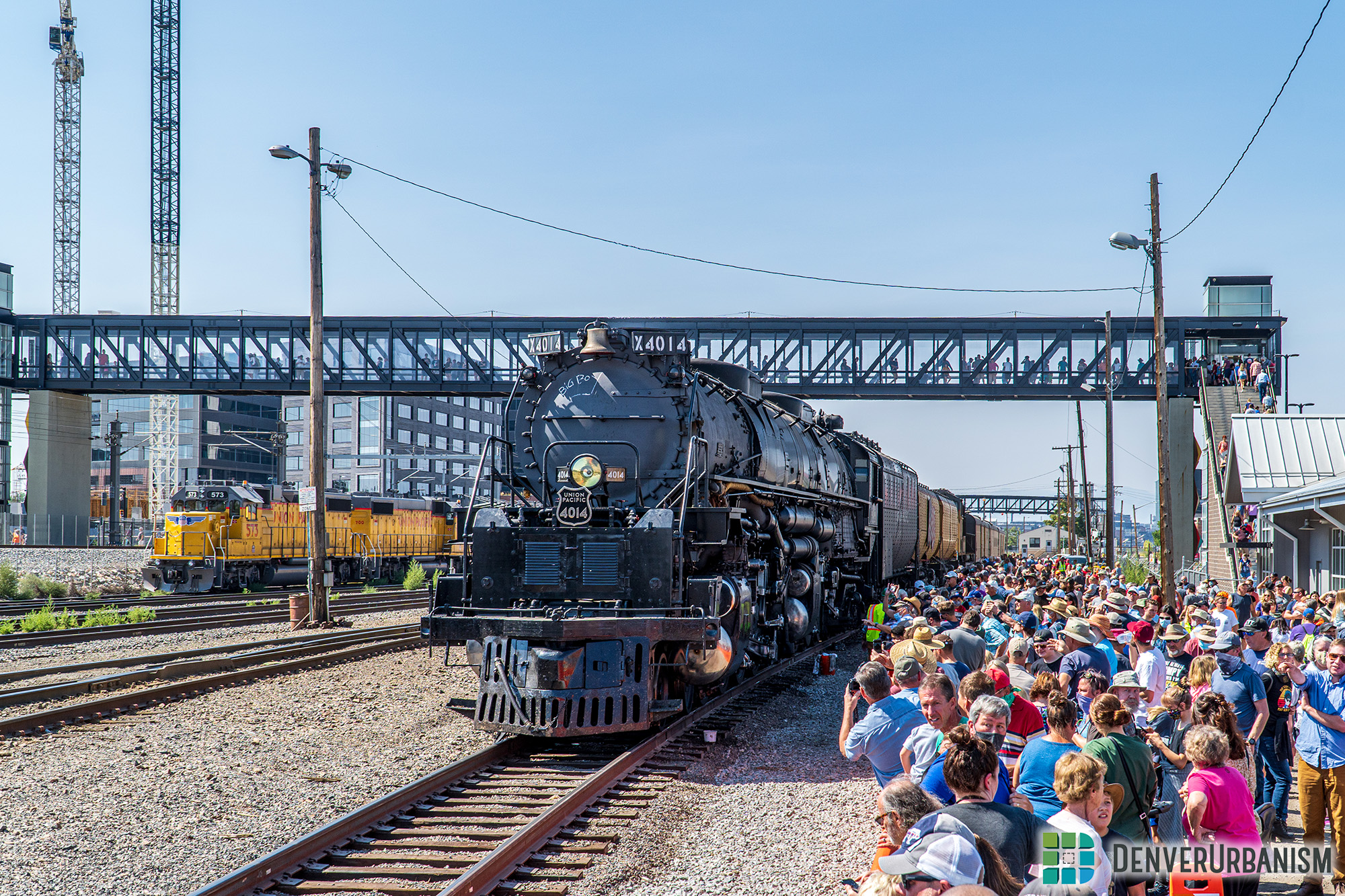by Camron Bridgford
On November 10, City and County of Denver officials—including Mayor Michael Hancock and District 7 Councilman Jolon Clark—alongside the board, staff and partners of Levitt Pavilion Denver, came together to celebrate the official groundbreaking of the new 7,500-person capacity amphitheater to be built in southwest Denver’s Ruby Hill Park. Scheduled to open on July 14, 2017, the outdoor music venue will host 50 free concerts a year, three times per week during the summer months.
Levitt Pavilion Denver—part of a growing, nationwide network of free outdoor music venues begun by Los Angeles-based Mortimer & Mimi Levitt Foundation—seeks to bring community together through creative placemaking that provides free access to music-oriented cultural opportunities. Foundation founders Mortimer and Mimi Levitt originally became committed to providing free outdoor music as a result of Mortimer’s experience growing up in a struggling immigrant family in Brooklyn, New York. While Mortimer would often go to Coney Island—where his father worked as a street vendor—he was unable to afford admission to either rides or concerts. Consequently, he would stand outside the gates of ticketed music events to hear the performances, which not only sparked his love for outdoor music, but also a belief in the importance of all people having access to music that strengthens community ties and broadens cultural experiences.
This story is significant when considering the chosen location for Levitt Pavilion Denver, which is not in the highly-desired pathway of new Denver development, but sandwiched between southwest Denver’s Ruby Hill and Athmar Park neighborhoods. These areas not only host significant Latino populations—nearly three-quarters of their residents—but are neighborhoods with poverty rates of 30 percent or more. Coupled with southwest Denver’s lack of high connectivity to public transportation, highlighted by minimal major bus routes and rail lines within reasonable walking distance, and lower-income and minority populations’ propensity to be more transit-dependent, Levitt Pavilion Denver brings culture and community through music to the doorsteps of many people who may otherwise struggle to access it.
While Levitt Pavilion Denver will undoubtedly be attended by people of all backgrounds and incomes from across the metro area, this chosen location of an underutilized park in a lower-income, high-minority neighborhood also speaks volumes about Denver’s continued commitment to “culture for all.” This belief was recently affirmed by the significant 63 percent majority who voted for the extension of the Science and Cultural Facilities District (SCFD) sales tax on November’s ballot, which dedicates a penny for every $10 to cultural and science-oriented non-profit organizations throughout the Denver metro area. Since the tax began in 1988, SCFD has raised more than $910 million for its cause, with $54 million alone distributed in 2015 to 270 organizations.
Levitt Pavilion Denver—which will feature national and international artists, as well as shows by local performers that help to proliferate Denver’s already robust music scene—has been a capital project in the works for more than four years. Originally slated to open in mid-2016, the $4.8 million price tag made fundraising a slow and difficult task that forced the grand opening to be pushed back to 2017. However, the necessary funds to bring the project to fruition were eventually obtained, including $2.8 million in bond monies from the City and County of Denver, $400,000 from the Mortimer & Mimi Levitt Foundation, and Levitt Pavilion Denver raising $1.6 million, including from local foundation contributions, such as the Boettcher Foundation, Bonfils-Stanton Foundation and the Gates Family Foundation. For ongoing operations, the amphitheater will also likely rely on additional, admissions-based shows and private event rentals to offset the cost of its free concerts.
While Levitt Pavilion Denver was not an easy feat to come by, its success serves as a victory for activating the underutilized Ruby Hill Park, which is Denver’s third largest public park but one that lacks programming and connectivity to its local neighborhoods. Planning for its facelift dates back to at least 2009, when Denver Parks and Recreation developed a master plan for the park that included engaging nearby residents in the process, many whom requested an outdoor performance space as part of its community-oriented design. Now seven years later, the soon-to-be-realized amphitheater’s management by CEO Chris Zacher, who undoubtedly understands the importance of access to music and culture from serving in leadership roles for Denver’s City Park Jazz for nearly a decade, further helps to ensure a vision of weaving civic connection through culture.
It is especially during this time, when topics of division in our communities have been thrust into an uncomfortable and tense spotlight, that the groundbreaking of Levitt Pavilion Denver stands in firm defiance of endorsing a dismantled populace. Rather, its success, even against financial odds, promotes the inherent value in providing public space that becomes a “third place”—neither home nor work—where diverse communities in Denver can coalesce through the shared cultural experience that love for music brings.
~~~
Camron Bridgford is a master’s candidate in urban and regional planning at the University of Colorado Denver, with a particular interest in the use and politics of public space as it relates to urban revitalization, culture and placemaking, and community development. She also works as a freelance writer to investigate urban-related issues and serves as a non-profit consultant.














Is this really necessary? Of all the attractions the Denver area already has or might be missing, an amphitheater does not seem to be one of them.
Right now, there are plans to massively expand the Convention Center and the Performing Arts Center. Denver metro already has Red Rocks, is there really a demand for this kind of thing? I can see Denver benefitting from a few more indoor venues for smaller-mid-size bands to play, but that will probably happen naturally and will not require a city-wide effort.
Denver proper can certainly use a few more attractions…maybe an infill equivalent of an “LA Live” of sorts since the Pavilions doesn’t really cut it in my opinion compared to what other cities like Seattle and Austin have.
I could see Elitch’s eventually moving and a bigger theme park and waterpark taking it’s place in a different part of the city, maybe swapping places with Dick’s since the rest of Denver’s sports professional sports scene is Downtown where a new soccer stadium could be built adjacent to the Pepsi Center along with a big new parking structure where mixed use, dense housing replaces the area where the rides presently stand. It would be good to get rid of all of that ugly pavement in that corner of the city.
James, the West Side needs a large cultural venue like this pavilion planned for Ruby Hill Park. You are right — Denver already has a lot of great cultural spaces, but Southwest Denver is almost devoid of this type of music venue. Besides the majority-Hispanic population, Denver’s Vietnamese community is clustered along South Federal Boulevard. Hopefully, the Levitt Pavilion will be a place for Vietnamese musicians to share their music with a broader spectrum of people, along with Latino and other kinds of music entertainment. This space-making will have a positive effect on the Ruby Hill and Athmar Park neighborhoods.
How do you qualify “needs” for a culture venue? Ruby Hill is within walking distance of the Evans light rail station and therefore, the rest of downtown within a few minutes. Are we saying that every corner of the city, every district, needs a sanctioned “culture venue”? Or are you saying these are only needed where there is a non-white cluster of Denver residents like in the Latin and Asian (what few Denver has) neighborhoods? Ruby Hill is closer to Red Rocks than the vast majority of Denver neighborhoods and with access to the light rail, it is easier to get to the convention center and performing arts center from there than plenty of Denver neighborhoods. If any part of the city is starved for culture, it would be the northern suburbs that are not within walking distance of Boulder. This is an investment specifically for Ruby Hill – this is not going to be a Denver-metro-wide attraction and if we think that will happen, unless they are going to book major bands there (which I highly doubt – they want to play at Red Rocks), I think we are kidding ourselves. This is going to be a deadspace for 95% of it’s useful life with less grass, less trees, and fewer people actually using the space throughout the average day. I simply do not believe that based on its present population and amount of venues currently configured to performing arts, that Denver is lacking or that such an investment like this is needed. Most inner suburb neighborhoods (Ruby Hill less so) need stronger access to the city, thus dollars need to be going downtown or to transit. This is my problem with the promotion of “cultural centers” funded by public money – there will forever be a “why not my race, why not my culture, why not my type of music” hole that we dig ourselves into with this stuff. I will grant that outdoor amphitheaters are actually one of the easiest investments to justify since when they are well-planned, they can bring money to the city. BUT Denver metro has plenty of these in other areas that will continue to absorb the Denver metro’s demand. When anyone NOT from Ruby Hill wants to go to an outdoor show (and is willing to pay for it), they are going to go to Red Rocks.
Walkable, you are joking right,the shortest path from the station to the park is 1.2 miles, crossing Sante Fe, train tracks, the river, 4-6 onramps, and Evans itself and not to mention numerous loading docks. All of this through an neighboorhood of concrete barriers and windowless industrial buildings, you wouldn’t do this and you certainly wouldn’t make your significant other do it dressed up in concert attire.
Welcome to inner American suburbia! I take it you’re talking about Evans avenue being too crunchy for you? Evans avenue has indeed not gentrified yet, and it certainly could use a better sidewalk, but my point was that not every single neighborhood needs a big ol’ amphitheater – especially since Ruby Hill is a substantially closer drive to Red Rocks than most Denver suburbs(an amphitheater that is already built and gets used because it is a world-class venue). I think if the city wants to build attractions, it should build the types the region as a whole lacks – which in Denver’s case, are not outdoor music venues. Denver needs an LA live or a Cedar Point! The light rail and even future streetcar lines cannot touch every corner of every neighborhood, Denver’s light rail is designed mostly to operate as a regional network to get suburbanites into and out of the city. If you want to get around without a car, Ruby Hill is probably not the Denver-area neighborhood to move to right now. There are cheaper options elsewhere in the city that have better transit and walkability, this is not an economic issue. Ruby Hill needs better pedestrian options to connect it to transit, not an under-utilized block of concrete.